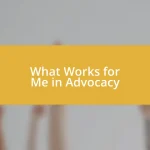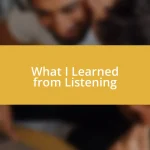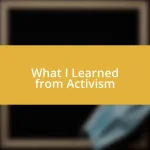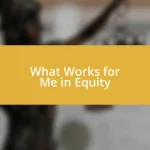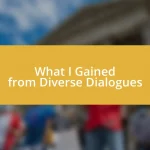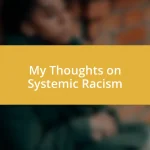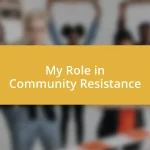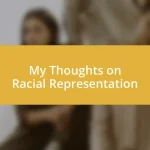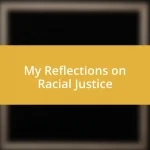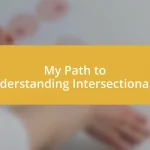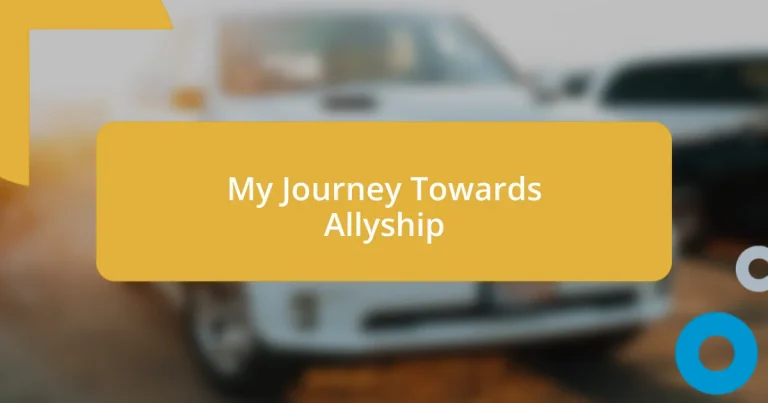Key takeaways:
- Allyship involves ongoing self-reflection, active listening, and genuine support for marginalized communities.
- Recognizing personal privilege is crucial for understanding and advocating for social equity.
- Creating safe spaces for open dialogue enhances the voices of marginalized individuals, fostering empowerment and mutual understanding.
- Inspiring others to act is often achieved through personal storytelling, leading by example, and celebrating collective victories in allyship efforts.
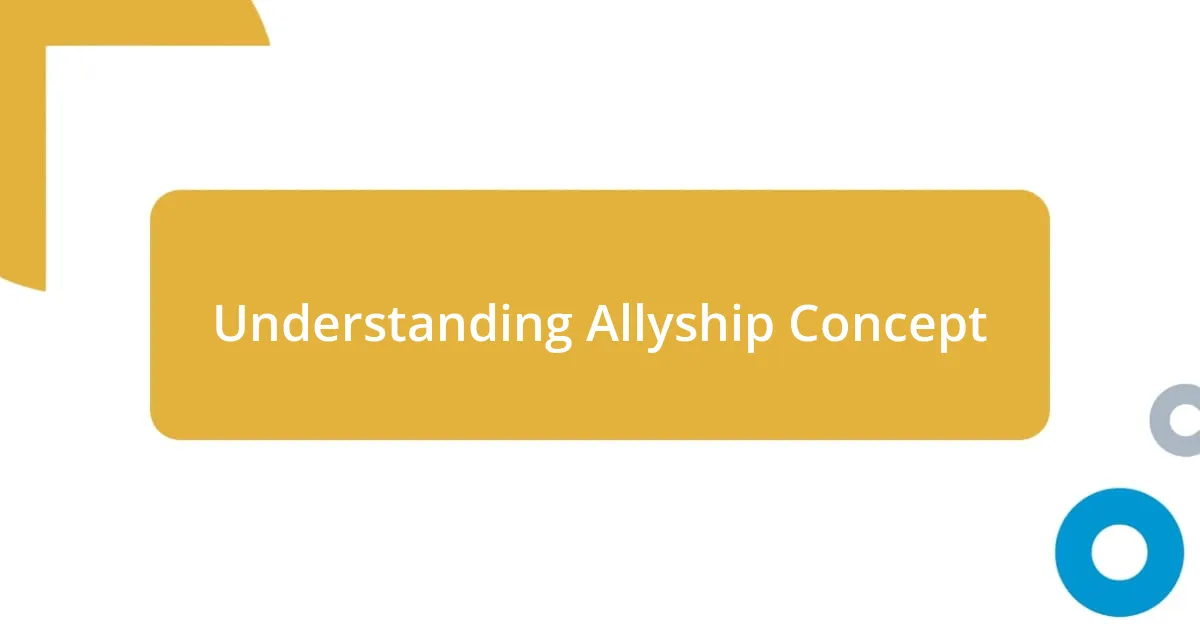
Understanding Allyship Concept
Allyship is more than just a label; it’s a continuous commitment to understanding and supporting marginalized communities. I remember a time when a friend opened up about their struggles with discrimination. It hit me hard—realizing how vital it is to not just listen, but to act in ways that uplift their experiences and voices. Isn’t it eye-opening to think that simply being a friend isn’t enough?
Engaging in allyship requires active participation. I’ve participated in workshops where I confronted my own biases—an uncomfortable but necessary experience. These moments taught me that allyship isn’t about being the hero; it’s about being there, ready to amplify others, especially when it’s inconvenient. What does it mean to be genuinely supportive? For me, it’s about showing up when it matters most, even if it requires vulnerability.
True allyship flourishes with self-reflection and continuous learning. I’ve found that reading stories and experiences from different backgrounds deepens my understanding of the struggles people face. But it’s not just about absorbing information; it’s about translating that knowledge into meaningful action. How can we become better allies if we don’t engage with the uncomfortable truths of our society? Embracing this journey means acknowledging that the path to allyship is ongoing, filled with both successes and setbacks.
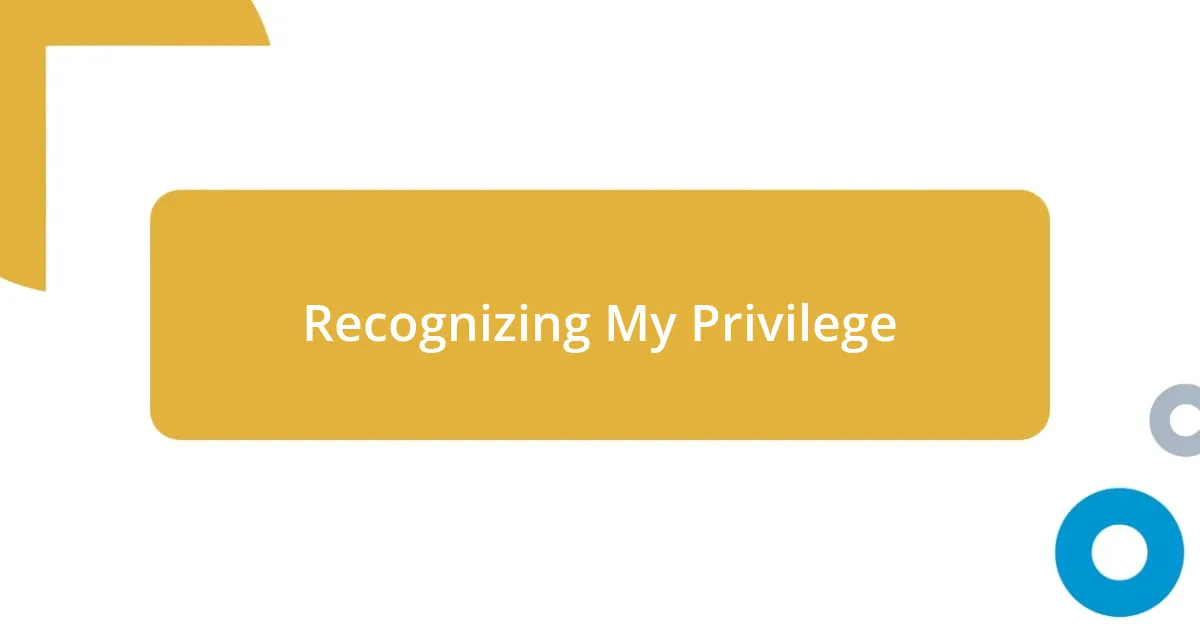
Recognizing My Privilege
Recognizing my privilege has been one of the most enlightening experiences in my journey towards allyship. I can recall a moment when a close colleague shared their battle with systemic barriers at work. Hearing their story made me acutely aware of how my job security and opportunities were often a function of my background, rather than just my merit. The contrast between our experiences was stark, and I felt a mix of shame and responsibility surge within me.
Here are some aspects of privilege I’ve come to recognize:
- Socioeconomic Status: I grew up in a comfortable financial situation, allowing me access to education and resources that others lacked.
- Racial Identity: As a member of a majority racial group, I often navigate spaces without fear of prejudice or discrimination.
- Gender Norms: In my professional life, I’ve rarely encountered challenges purely based on my gender, unlike many of my peers.
- Educational Background: Attending a well-regarded university opened doors for me that aren’t always accessible to everyone.
- Network Connections: I have access to a broad network of individuals who can provide mentorship and job opportunities, something not available to everyone.
Acknowledging these privileges does not minimize my hard work; rather, it enhances my awareness of the injustices that others face. It’s a humbling realization that compels me to advocate more fervently for change and equality.
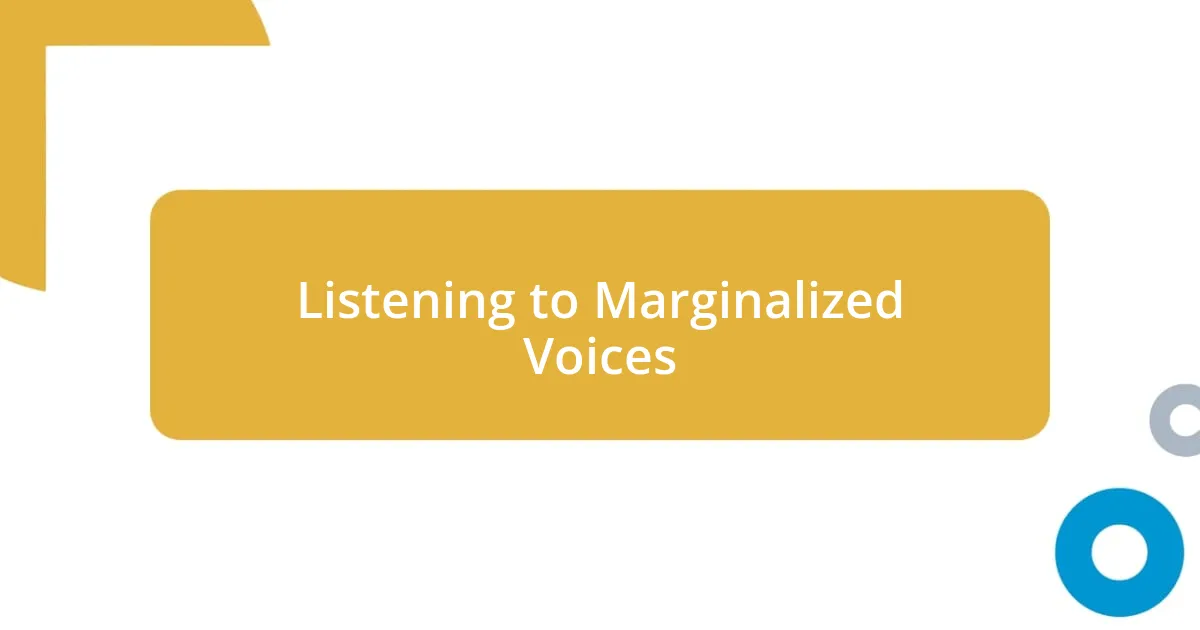
Listening to Marginalized Voices
Listening to marginalized voices has been a transformative part of my allyship journey. It’s not just about hearing words; it’s about truly understanding the emotions and experiences behind them. There was a time I sat in a community meeting when a speaker shared their story of resilience in the face of adversity. I felt compelled, listening intently as their words painted a vivid picture of struggles I could only imagine. It dawned on me how often we overlook these narratives, taking for granted the power they have to enlighten and inspire change. Have you ever had that moment when a person’s story resonates so deeply that it leaves you questioning your own experiences?
I’ve learned that genuine listening requires more than just being present; it demands an open heart and mind. I remember volunteering with an organization focused on advocating for LGBTQ+ rights and hearing firsthand accounts of discrimination. Those stories changed me. They weren’t just statistics; they were real people with real suffering. By actively engaging with these voices, I saw how listening could serve as a catalyst for empowerment and healing. It’s essential to pause and reflect—are we truly listening to understand, or simply waiting for our turn to speak?
Creating safe spaces for marginalized voices to be heard is another critical aspect of allyship. I once hosted a dialogue session where individuals from various backgrounds shared their stories of identity and belonging. The atmosphere was electric; the authenticity in the room was palpable. It reinforced my belief that when people feel safe, they share their truths more freely. As allies, we must strive to not only facilitate these discussions but also educate ourselves to ensure that the narratives shared are respected and valued.
| Aspect | Description |
|---|---|
| Active Listening | This involves being fully present in conversations with marginalized individuals, focusing on understanding their perspective. |
| Storytelling | Engagement through personal stories helps bridge the gap between experiences, fostering empathy and understanding. |
| Safe Spaces | Creating environments where people feel comfortable sharing their truths enhances dialogue and promotes healing. |
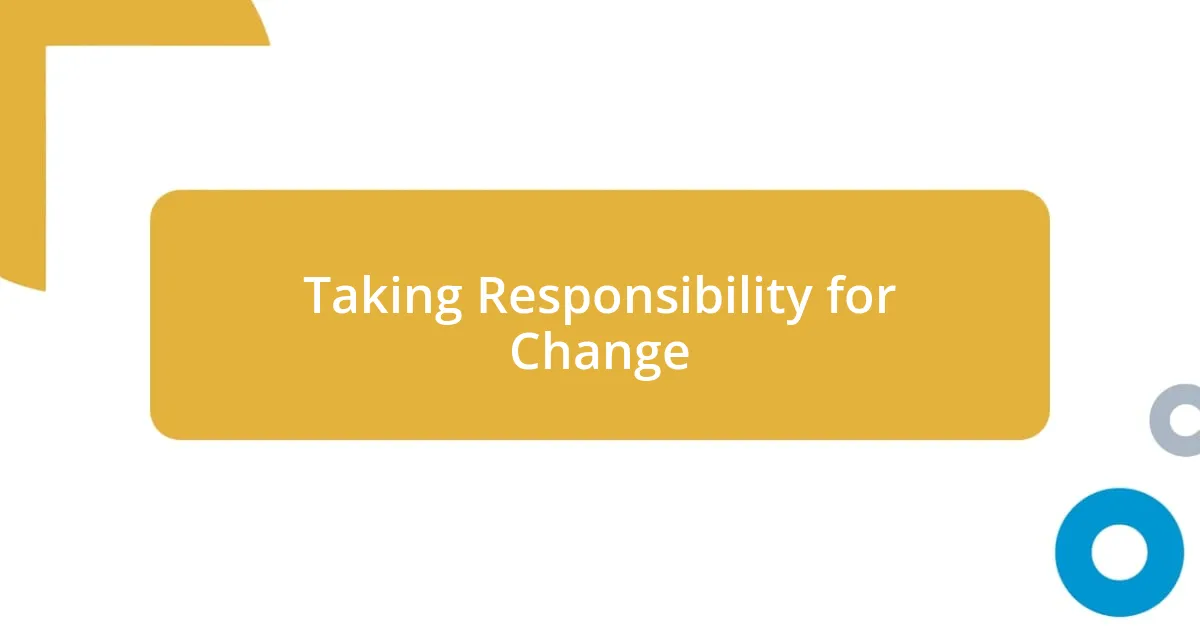
Taking Responsibility for Change
Taking responsibility for change is a journey that often begins with uncomfortable self-reflection. I remember a moment when a friend confronted me about a comment I made that unintentionally perpetuated stereotypes. Initially, I felt defensive, but then I realized it was an opportunity to own my ignorance and learn. How often do we brush off our mistakes instead of taking the time to understand how they impact others? It’s crucial for us, as allies, to acknowledge our missteps openly and commit to growth.
Moreover, responsibility isn’t just about personal actions; it’s about influencing those around us. I often find myself in conversations where I can either let stereotypes slide or challenge them. Recently, in a meeting, I noticed a joke that trivialized diversity efforts being made at our company. Rather than staying silent, I spoke up, emphasizing the importance of inclusivity and what it means for everyone. I felt a wave of vulnerability washing over me, but I also saw nods of agreement and relief from others. By taking a stand, I realized I was not only advocating for change but also encouraging my colleagues to do the same.
Finally, change requires continuous effort, even when it’s met with resistance. I once participated in a workshop aimed at racial equity, where an uncomfortable silence fell over the room as our facilitator challenged us to confront systemic racism. I could feel the tension; it was palpable. Yet, I also felt exhilarated by the idea that discomfort could lead to discovery. Embracing responsibility means we must persevere through these difficulties, especially when our comfort zones are pushed. Are we ready to face those challenges head-on for the sake of allyship? I believe we must be.
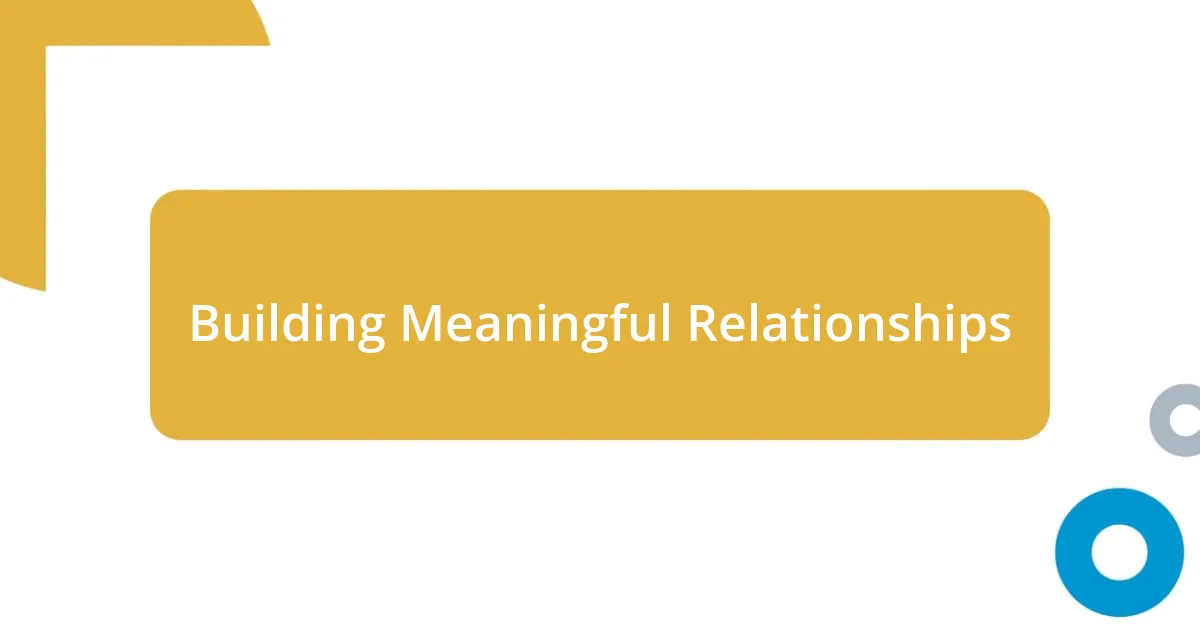
Building Meaningful Relationships
Building meaningful relationships is essential in the journey of allyship. I fondly remember my first participation in a local LGBTQ+ pride event. Initially, I felt like an outsider looking in. But as I struck up conversations with attendees, sharing laughs and stories, something beautiful unfolded. It hit me how each connection, no matter how brief, was a reminder of our shared humanity. Have you experienced that moment of bonding over a common experience that changes your perception?
To deepen these relationships, vulnerability plays a vital role. At a community gathering, I shared my struggles with understanding privilege. It felt risky, laying bare my uncertainties, but the openness of the room encouraged others to share their own experiences. I vividly remember a woman speaking about her journey navigating multiple identities, and the weight of her words fostered an unspoken bond among us. Isn’t it fascinating how revealing our own imperfections can invite others to do the same?
Consistent engagement is also crucial. I’ve learned that relationships built on allyship require more than just occasional support. I made it a point to check in regularly with friends from marginalized communities, offering not only emotional support but also knowledge-sharing about their experiences. I’ll never forget the day one friend expressed how my proactive outreach made her feel seen and valued, as if her struggles were shared and understood. Doesn’t it feel rewarding to know that your efforts to connect can truly uplift someone else?
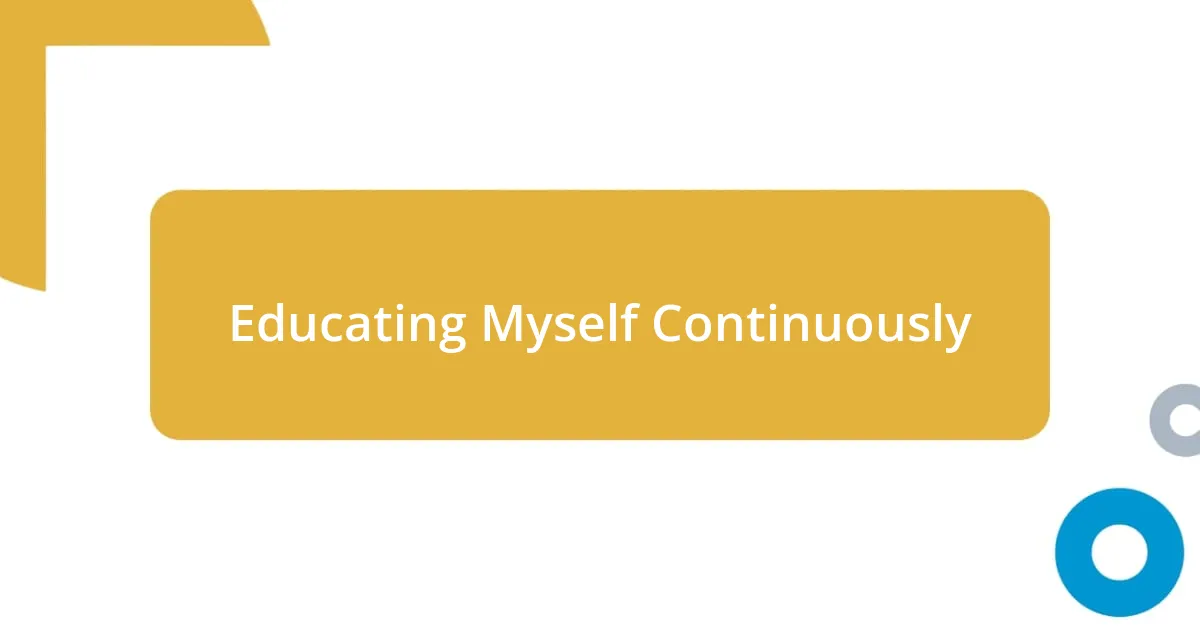
Educating Myself Continuously
Educating myself continuously is a commitment I embrace wholeheartedly. I often delve into books, podcasts, and articles that challenge my existing beliefs. There was a book that profoundly shifted my perspective on gender identity. I remember sitting on my couch, captivated by the author’s journey, and realizing how much I had to learn about experiences vastly different from my own. Have you ever felt that spark of enlightenment when you read something that resonates deeply with you?
Taking courses has also played a pivotal role in my education. I vividly recall attending a workshop on unconscious bias; it was eye-opening. As we explored interactive scenarios, I felt both discomfort and motivation surge within me. It dawned on me how these biases can unintentionally shape our interactions and decisions everyday. Have you ever been in a situation where a new insight shifted your viewpoint? This was one such moment for me, and it reaffirmed my commitment to keep learning.
Additionally, engaging in discussions with diverse voices enriches my understanding. I cherish moments where I can sit down with friends from different backgrounds and simply listen. Just the other week, over coffee, I learned about one friend’s experience growing up in a different culture. Listening to her stories allowed me to see the world through her eyes, and it reminded me of the importance of perspective in allyship. Isn’t it fascinating how every conversation can be an opportunity to learn and grow? I find that knowing we all have unique stories fuels my passion for continuous education.
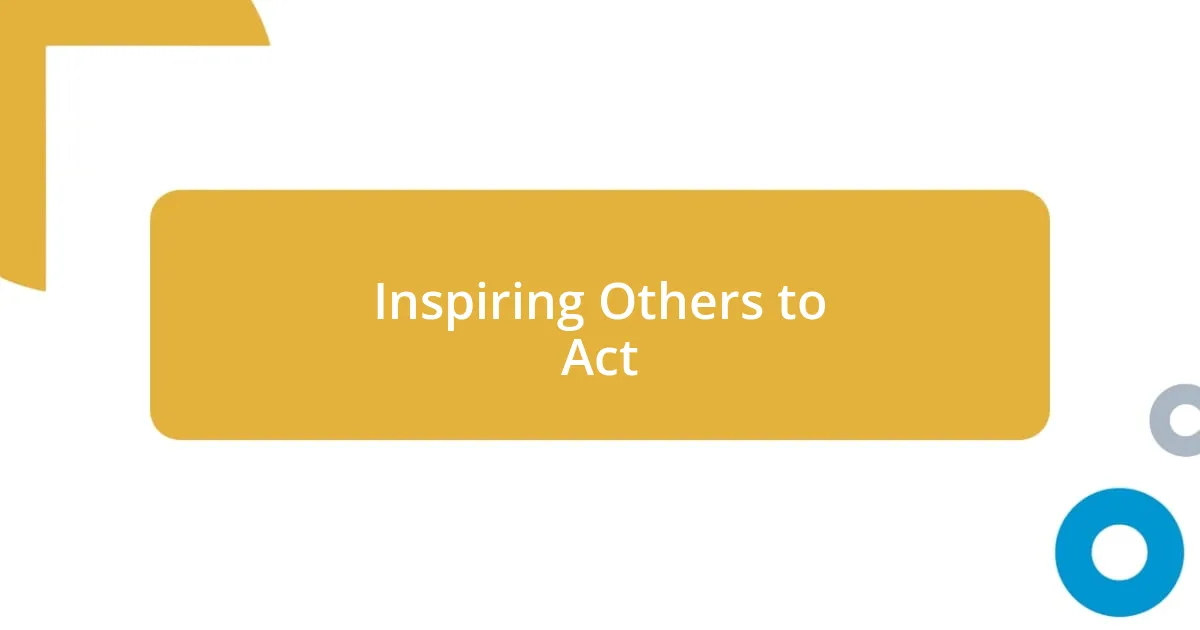
Inspiring Others to Act
Inspiring others to act often starts with sharing my own experiences. Recently, I recollected my first time volunteering at a local community center. As I painted a vibrant mural with kids from diverse backgrounds, their enthusiasm was contagious. I realized then how simply being present could ignite a spark in someone else. Have you ever thought about how your passion might motivate those around you to join in?
I also believe that leading by example plays a crucial role in encouraging action. A while back, I organized a small book club focused on stories by marginalized authors. The excitement and conversations that blossomed from our discussions really surprised me. Watching my friends dive into these narratives with open hearts and minds reminded me that sometimes, creating a space for dialogue is all it takes to inspire others. Isn’t it interesting how a shared experience can foster a sense of collective responsibility?
Moreover, recognizing and celebrating small wins can amplify motivation. I remember the joy I felt when a friend, after hearing about my advocacy work, decided to speak out against discrimination in her workplace. Her courage was a direct result of our late-night chats about the importance of allyship. That moment taught me that every action, no matter how small, can create a ripple effect. Don’t you think it’s empowering to know that our voices can embolden others to step up?
